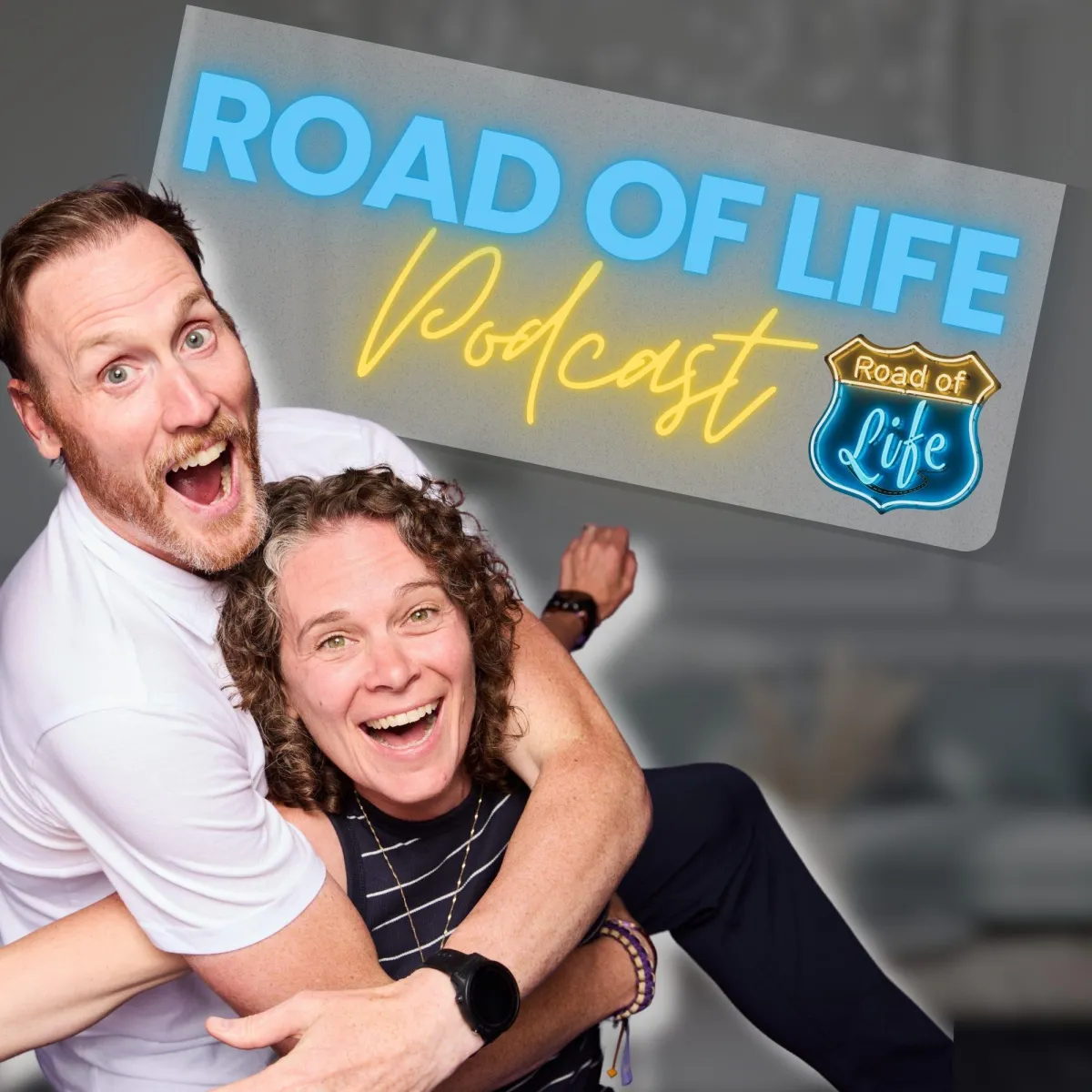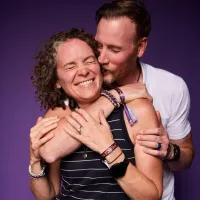
The
Road of Life
Podcast
With Meredith MacKay & Craig Bennett
Listen

50. Why 50/50 is a Marriage Myth
Listen Now
Episode Transcription
Welcome back to the road of life podcast with Meredith and Craig. What do we got this week, Bennett? Accountability in your marriage, taking accountability. Yeah. What that means. Yeah. I think one way we've said it, that rocks a few boats is that a successful marriage is not 50 50.
Yeah.
We, I don't know about you, but I heard that, I don't know where, but a lot of places growing up that, You know, a good marriage is 50 50.
It's a 50 50 partnership. That's what makes a good marriage. Mm-Hmm. and my experience, that is just not true.
what do you mean by that? Okay. What I mean by that is a good marriage is 100%. 100%.
Yeah. It's
a, it's a hundred. A hundred, not 50 50. Yeah. That means that I am 100% accountable for our marriage, for the state of our marriage. Yeah. But so am I. But so are you. Yeah. And so when we both have the lens or the perspective that I'm a hundred percent accountable for the state of our marriage that means I'm not waiting for you to do your part. We're not trying to figure out who's 50 percent this thing falls within if we're looking at something. If I'm a hundred percent accountable.
I don't wait for you to figure out your 50 percent. I'm a hundred percent accountable. So I Show off and do the thing. Yeah. I'm the first one to apologize. I'm the first one to say, I love you. I'm the first one to ask for a hug. I'm the first one to take the freaking garbage out because that's our go to example.
And when you both have that perspective of, I'm a hundred percent accountable for this, you're willing to be the first to do the things to just see what needs to be done and do it and not say, Oh, that's your 50%. I'm going to wait for you to apologize to me first. So what it really means is that you are 100 percent accountable.
You own 100 percent without any doubt, your own actions, decisions. It's all on you. And if you take that mentality and the other person takes that mentality, then you've got a 200 percent marriage. And a 200 percent marriage is, well, it's unstoppable. It's amazing. I think one place that people sometimes get confused with this concept.
There's a difference between I am a hundred percent accountable every day versus I'm given a hundred percent of what I have to give every day. They're not, they're two separate concepts. We've talked about this before in other places. And I think it was confused for, for folks around like, well, but yeah, but you can't show up every day at your a hundred percent self.
And that while that is true, for sure, that is a hundred percent true. Let's go 100 percent everywhere here. That is a hundred percent true that you can't, you're not going to be at your a hundred percent every day but you can show up the best you can on that day, which is the a hundred percent you have for that day.
Yeah. But that is not what we're talking about here. Correct. Because every day you can still be 100 percent accountable for your marriage. Right. I may only be operating at 37 percent today. I didn't get a good sleep. I ate something I shouldn't have. I don't feel my best. I'm not operating at 100 percent of my best self today.
Yeah.
That's, that's fine. You're still I can still be 100 percent accountable. But, you know, if something needs to be done, I do it. If something needs to be said, I say it. Apology is required, maybe one's required from each of us, but I'm not waiting for you to apologize to me so that I then apologize to you.
Yeah. If you're in a marriage where I'll apologize, but they got to apologize first because what they did was worse. So they got to apologize to me first. I'm willing to apologize, but I got to wait and see what they say. That's a relationship that's going to go in a very different direction than one that has a person that's like, you know what?
I played a part in this. I'm 100 percent accountable. I'm just going to apologize. If they apologize, great. If they don't, whatever. I know I did my part. And that relationship, first of all, when you're willing to apologize, it's way more likely the other person's going to not play that game. For sure.
And then secondly, that is the kind of marriage that's going to go to the moon. Right. The other thing that I just realized from what you were saying that happens is when you take 100 percent accountability for everything in your marriage is you don't keep score. You, in your example right there, you said, yeah, I'll apologize, but they're apologizing first.
They owe me an apology first because what they did was worse. And the only way you get to that, what they did was worse is if you're scorekeeping in your head that I'm better than them because what they did was worse than me. So I'm in a better standing than they are because what I did wasn't as bad as what they did.
So one, nothing for me. Basically is kind of the gist of that situation. And so if you're 100 percent accountable, there's, there's no score cause I am accountable for it all. And if you have that same perspective and there's never a score. Exactly. And the thing that, why this matters, why this is so important is that having accountability builds trust trust in your marriage. Like the other person knows that you're in it for the long haul. They begin to trust you more. It just builds this foundation of trust and respect. So that's why it's so important to switch that thinking from a 50 50 marriage to a 200 percent marriage. Right.
Other thing that happens when you take 100 percent accountability for your marriage is the impact on the other person. Because when I take 100 percent accountability, you're less likely to get defensive and feel blamed and feel like I'm attacking you because I'm taking 100 percent accountability for what's going on.
Therefore I'm not putting any blame on you. Whatever happens. Whatever situation we've gotten ourselves into, we're a team, regardless of whose idea it was, we got ourselves into the situation. I have as much accountability for agreeing to go along with you as you do for wanting to go in that direction.
You know, if we get lost, let's say we get lost cause you know, we never get lost with my left and right problem. If we get lost, And we take 100 percent accountability. I told you to go left. I meant, right, you went left. That happens with us a lot. When you take 100 percent accountability for our marriage and for where we are, you took that turn.
So you're taking your accountability for taking that turn. We got ourselves lost. We are in it together. That means I don't feel blamed. I'm not going to get defensive and go on the attack. Okay. because you've not attacked me first because you're taking accountability. Great example. In the future though, like when you say left, just mean left. When I say left, I'm doing my best. I love it.
The other thing that comes along with taking accountability. When you take accountability, you're admitting when you're wrong, you're owning your piece of whatever's going on. It builds more trust when you raise your hand and say, you know what? I'm sorry for my part. I played in this.
We're talking a lot about taking accountability. So what does that look like? How do people take accountability?
One way is you own your mistakes. Admit when you're wrong. Yeah. it shows a willingness to learn and to be open to getting better and feedback.
Mm hmm. Which takes Courage. It takes vulnerability. Being willing to own your mistakes and admit when you're wrong and be open about what you've done. It's not always easy. No, like it's not sometimes really hard. It gets a simple concept, but it can be difficult, especially if the dynamic in the marriage so far has not been that. And that when someone does admit wrongdoing, then they feel attacked and they feel shame and blame and guilt and all those things. Yeah. There has to be the, you have to foster that environment of trust and openness for that person to want to be able to admit a mistake because if in the past they've admitted a mistake or made a mistake and just felt attacked and beat up, then it's going to be really hard for someone to come forward and openly admit a mistake, knowing that that's the potential outcome.
Right. So it's really about fostering, that environment where mistakes are okay. Failure is okay. In fact, and this has taken me so long to get there. Like I'm in my forties now, but it's taken me forever. I was a perfectionist. I'm recovering perfectionist, but Mistakes are a good thing. Failure is a good thing.
It shows, well, one way not to do it. But you get to learn a ton. And it's all about that journey of, it means you're doing something different. It means you're taking a risk. You're, you're trying things. And so having that mentality of mistakes are okay and we're all human is going to make Admitting mistakes a lot more palatable for the other person in your marriage.
Right. Especially if you're leading the way you're starting. Admitting your own. Yeah. And it's tough to be the first one in a marriage to try and change the dynamic, for sure. But it's 100 percent accountability in your marriage. Right. Exactly. Lead the way. Leaders lead. They go first. Yeah. So by going first, you're owning your 100%.
You're owning it all. Right. And you're making it safe for them to own it all because you're role modeling the behavior. So you want them to do it too, but you have to also make it safe for them to do it. So that means when they do take accountability and own something, own a mistake, admit to something that you make it safe for them to do it by having empathy and grace and compassion.
Yep. You're not piling on, you're not beating them up.
Another way is to keep those lines of communication open. Being able to share your thoughts, feelings. Like obviously if you're going to open up about mistakes, you need to be able to talk about your feelings, your thoughts, the things that are going on with you.
And that's really how you build connection. Well, it's those weekly connection conversations that we talk about where you share what's going on with you. Like what's gone on this week. What, what didn't work? What went well? What are you afraid of? What's keeping you up at night? What are your goals?
That weekly connection where you sort of debrief on the week that happened and how that went for you and you go into the next week feeling aligned. That helps build that connection, that safety, that trust, so that you can share in those conversations and outside those conversations. when you need to take some ownership of, of things in your marriage, in your life.
And you know, the daily check in questions, just keeping those lines of communications open so that, you know, when you're asking your spouse, what was the best part of your day? What was the worst part of your day? That they can actually share that with you because they feel safe to share it. So you're taking accountability also for the environment you create in your marriage.
And so if, if you're not having those conversations and maybe you feel like They're not opening. They're not opening up to me. I'm trying and they're not opening up to me You still are accountable for the environment you've created in that marriage Chances are that there is an environment that makes it so they don't want to be open They don't they can't share.
Yeah, they don't feel safe There's also probably a lot of variables and past experiences. We all bring all that stuff into a relationship Which is part of your accountability Bye Every single situation in your marriage you are accountable for in some way, shape or form. You can always find that accountability.
Going back to making mistakes and admitting them. The other part of that that we didn't really talk about is making amends for them. So it's one thing to like say, okay, yep, I screwed up. You're taking that accountability. I made a mistake. I should have done different here. but then what do you do about it?
It's changing the behavior, making sure you're not repeating it, fixing the situation that you've created. That's all part of accountability. Correct. It's not just owning it. It's also changing it. Yeah. You have to do something with it once you have identified it and own it. It's okay. How are we changing it? How are we learning from this, getting better and not doing it again in the future? Yeah.
So ways that we don't take accountability that are pretty common that we see pop up a lot is the blame game.
Yeah.
And I've lived this in my life as a perfectionist, people pleaser, you know, I never wanted to be wrong because I never wanted to fail because I was a perfectionist.
Like that was just the way I lived my life. And so it's easier in the moment for me to put the blame on someone else because it couldn't possibly be my fault because I'm a perfectionist. I'm perfect. I didn't make this mistake. This was you. I assure you that whatever's gone wrong here was not me. This was somehow you.
Exactly. The finding a way to shift the blame is a sneaky way that we avoid accountability. Yeah. And I think it's something that we've both been guilty of given that we're both recovering perfectionists. It's something that we've had to both work hard to overcome. It's it's not easy. And we're certainly not perfect in any of these. It's more, it's a journey. It's absolutely a journey. It's absolutely a journey.
Another thing that we do, I guess, to avoid taking accountability is, making, making an excuse. Justifying it. Yeah. Yeah. Yeah. But like you did this and it pissed me off that day. And so I wasn't operating at my best because you kind of like, you know, set me off. You made me feel whatever justifying, Oh, I did this because finding an excuse, a reason, a rationalization, trying to find a logical justification for why You made the mistake you did or why you created the situation you created.
I remember my mother saying a long time ago that, I don't remember her exact words, but basically like, a serial killer can rationalize their behavior. Anyone can rationalize and find justification for their behavior. Anyone. Anyone can justify anything.
You can. Yeah. Leave the reasons aside. The excuses, the justifications, the rationalizations, that's, that, those are meaningless. At the end of the day, it doesn't really matter. No. It doesn't. Like Only when you're keeping score, it doesn't matter. Yeah, like, I, it just, it doesn't, doesn't matter. At the end of the day, it doesn't matter why something happened.
It happened. Now let's just deal with it.
Yeah.
How are we going to deal with it? I don't care what the excuse is. Yeah. And, and I guess if you're fostering a 200 percent marriage, then it's really who cares the circumstances around it. As long as it's not something that's going to rear its ugly head again at some point.
But like, let's take that completely out of the equation. What's the problem? Let's identify it. Okay. And now let's forget about that too. And let's just focus on solutions because when you focus on solutions, you get more solutions, you get more creative, you start to figure your way out of the problem. So, stay away from excuses and focusing on problems. Shout out to the Russian cat episode again. That old Russian cat. Okay. Learned some great lessons there. Keeps coming up.
So basically having a 200 percent marriage, taking accountability in your marriage is How you build connection, how you build respect, how you build trust in your relationship, intimacy.
Cause you get asked a lot, like, how, like, how do we build, how do we get back to communication? How do we rebuild intimacy? Like we've got lack of trust. Like, how do we build that back? Well, it starts with taking 100 percent accountability, both of you and having a 200 percent marriage. If you can create a 200 percent marriage, you are going to reconnect emotionally, physically, you're going to create your communication is going to come back. You're going to create this intimacy and you're going to rebuild trust. It's those are the big four. And if you have a 200 percent marriage, you will get there. Yeah. It sounds simple. It is simple. It's not always easy, but it is simple to take 100 percent accountability for everything that's going on.
And this is a journey. This is something that this is a new concept. You're not going to be 100 percent perfect all the time. You're going to catch yourself. You're going to become aware. Yeah. There's going to be the odd time you find yourself. Oh, I blamed, I, I made an excuse. I didn't take accountability there.
And that's okay. You're trying. You're, you have to be able to give each other grace as well. So you're like, you, your, your goal is to get to the 200 percent marriage. Are you going to be there tomorrow? Absolutely not. Right. Okay. So have grace, have empathy and understand that when that, when your spouse maybe makes an excuse that they're trying and you made one last week and you're trying and you're trying and you're giving each other grace and you're having empathy for one another and you're striving for a 200 percent marriage, right?
Becoming aware is the first step becoming aware of when you are and are not taking accountability and just looking to reduce the times when you don't and increase the times when you do.
If you got any value out of this episode, we would love if you shared it with someone else who also would get some value out of it. Let's help everyone have a 200 percent marriage. Everyone would be so much happier, happier, healthier, whether like either marriage will be so much happier, healthier, thriving.
And then when you have that, you have the energy to put it towards everything else, like the actual health in your life, like physical fitness and building your dream life. And when you've got a bunch of people, you've got a bunch of people in the world having healthy marriages, healthy bodies, love their life, building their dream career.
Like that's a world I want to be in. Totally. So let's help everyone have a 200 percent marriage. So share it with all your friends. We'll see you next week. Bye for now.

Meet
Meredith & Craig
Life partners, business partners, and best friends. We left the corporate grind to become fulltime entrepreneurs... with no idea what we were doing.
That made for some interesting, amazing, stressful, awesome, painful, scary, awful, awesome, insightful, unbelievable decisions, moments, experiences, relationships, and quite honestly, we wouldn’t have it any other way.
Our marriage is the foundation for everything else we build in our lives. It is a cheat code for life, and we believe that having that part dialed in levels up every other part of life.
We help others live their dream life... and that starts with a rock solid relationship so they can level up the rest of their lives too.
Tune in for a dose of laughter, love, a gentle ass kicking, and game-changing wisdom that will help you unleash your potential and build the life of your dreams together.









